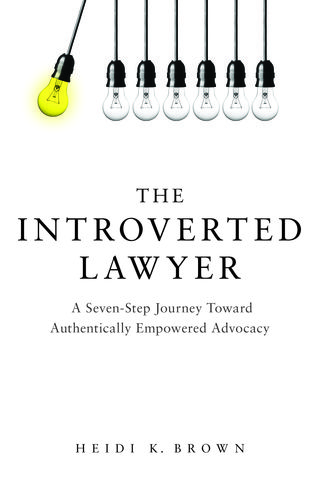Introversion
How Introverts Succeed as Lawyers
Quiet strengths can help you win.
Posted April 14, 2019

Is an introverted lawyer an oxymoron? Not according to Heidi K. Brown, author of The Introverted Lawyer: A Seven-Step Journey Toward Authentically Empowered Advocacy. In her myth-busting book, Brown shows how introverts can succeed in a profession known for arguing persuasively and competing to win. She contends that introverted lawyers contribute to the profession through strengths that include active listening, creative problem-solving, and careful legal writing. An introvert herself, Brown is the director of the legal writing program and an associate professor at Brooklyn Law School.
NA: Why did you write The Introverted Lawyer?
HKB: As a quiet and introverted law student nearly three decades ago, I struggled a lot with the performance aspects of law school—being cold-called in class, and participating in mock oral arguments, simulated client interviews, and negotiations. I thought there was something wrong with me because, in contrast to my peers, it took me a while to think through my answers to classroom questions. I also didn’t love the rapid-fire discourse that was expected of me in unfamiliar performance scenarios.
Nonetheless, I landed a great legal job in a very aggressive, hard-hitting construction litigation firm. I loved the substantive area of law; the cases were intellectually challenging, and I thrived and contributed readily in my initial research and writing role. But as a junior associate, I felt sick before every public speaking scenario, deposition, and courtroom appearance. Again, I (mistakenly) assumed that I somehow had a weakness that I had to “fix.”
Eventually, after 15 years of trying (and failing) to fake extroversion, I transitioned from law practice to teaching and noticed that my most insightful, creative, thoughtful problem-solvers and gifted legal writers often were my most quiet students. I began to study the differences between introversion and extroversion, and the distinctions among introversion, shyness, and social anxiety. That research led to two law review articles, and eventually my book.
NA: What goals do you hope The Introverted Lawyer achieves?
HKB: I hope readers—introverts and extroverts alike—can use the book to enhance their understanding about differences among team members in professional environments and the strengths that different personality types bring to the table. Writing the book helped me better understand my own natural quietude. I want to help other quiet individuals realize the tremendous assets they bring to interpersonal and business relationships. Further, instead of faking or forcing extroversion, which can cause unnecessary internal conflict and stress, I advocate for learning how to amplify our voices in an authentic manner when we need to make ourselves heard in a personal or professional interaction.
NA: It sounds as if we’re on the same page about the importance of authenticity. The first four steps of your seven-step plan focus on mental and physical techniques for introverts to “amplify their voices” authentically in performance moments. Would you describe those four steps?
HKB: The first four steps of the plan involve mental and physical reflection, and then mental and physical action to amplify our voices authentically, instead of following advice like “fake it till you make it”—which never worked for me.
In Step 1, we reflect on any unhelpful mental messages we play on a soundtrack loop in our minds in anticipation of, or during, a performance event. In doing so, we try to identify their original sources, decide whether the messages are in any way relevant to our current professional personas, and if not, give ourselves permission to delete or overwrite them.
In Step 2, we perform a physical inventory to assess how our physical bodies react in anticipation of, or during, a performance event. In other words, do we try to make ourselves small, hunch down, shrink, or cross our legs or arms, thereby blocking our energy, oxygen, and blood flow?
In Step 3, we begin ejecting the unhelpful and outdated messages from the past and crafting useful taglines and prompts for the future.
In Step 4, we adopt new physical stances, postures, and movement techniques to better manage and channel excess energy or over-stimulation ignited by an interpersonal exchange.
NA: What do the remaining three steps entail?
HKB: In Step 5, we construct a reasonable and practical “exposure” agenda—brainstorming a series of realistic interpersonal interactions and ranking them from least stressful to most anxiety-producing. Through this thoughtfully structured chronology, and with careful planning and mindful intent, we experiment with modified mental and physical approaches to each agenda event, with the goal of capitalizing on quiet strengths and amplifying our authentic voices.
In Step 6, we develop personalized mental and physical pregame and game-day routines for each exposure agenda item.
In Step 7, we enter into each exposure event, consciously integrating the new mental messages and physical adjustments adopted in earlier steps. Then, we reflect on and acknowledge successes and challenges within each exposure event. We tweak the pre-game and game-day routines for each subsequent exposure agenda item. Finally, we share our stories and empower others.
NA: Those seven steps sound like a powerful toolkit for introverts. You write about handling Socratic debate in law school. How do you recommend introverts in any career path prepare for situations when they’re put on the spot?
HKB: Because introverts naturally like to think before speaking, the expectation for an immediate response in dialogues like a classroom exchange, a negotiation, a courtroom or boardroom scenario, a networking event, or even a job interview can initially feel challenging. However, it’s transformational when introverts realize and begin to trust that they are substantively prepared, they know what they are talking about, and they do know the answers to tough questions. We then can arm ourselves with mental and physical techniques for jumping into the fray a little faster than our normal preference, when spontaneous dialogue is required.

NA: What “mental techniques” do you recommend?
HKB: Before I step into a scenario that involves “thinking on my feet,” I first conduct a mental reboot. I’m always substantively prepared, but inevitably the old soundtrack messages creep in about my ability to deliver “on the spot” responses. When I start to experience self-doubt about my natural ability to respond quickly, I press “pause” on the internal soundtrack. I tell myself, “Wait a minute. You’re substantively prepared. You absolutely deserve to be here. You have something important to say. You’re entitled to say it in your own authentic way.” Then I combine those fresh mental messages with a physical recalibration.
NA: Those techniques sounds powerful. Would you describe the mental soundtrack messages you refer to in the book?
HKB: For three years of law school and 15 years of law practice, I thought there was something wrong with me. I worried that I wasn’t “cut out” for the profession. When I started researching and writing The Introverted Lawyer and implemented the advice of the many experts I discovered in my research, I began to listen to, hear, and transcribe the negative mental messages playing on a soundtrack in my mind in anticipation of each performance event.
The words and language were unpleasant and harmful: “You’re going to look stupid and incompetent. You’re going to blush and turn red and everyone will sense weakness. Why can’t you just jump into the fray like everybody else?”
In doing this necessary self-study work, I realized that these harmful internal messages stemmed from feedback I had interpreted as critical from perhaps well-meaning authority figures in my past, and that I repeated over and over in my mind for years. I had to consciously decide that these outdated messages were no longer relevant to my new lawyer persona. It was time to delete them and create new ones.
NA: How do you replace the old mental messages with new ones?
HKB: Today, when I feel pre-performance jitters, the old messages automatically pop up. But I recognize them faster. I tell myself, “Oh wait, it’s just fear again.” Then I immediately launch my new mental taglines: “You deserve to be here. You have something important to say. You’re entitled to say it in your voice. Who cares if you blush or turn red? Who cares if your voice shakes? You’re amazing. Now go.”
Reframing the mental messages in advance—and again in the performance moment—provides a 30-second mental reboot to remind myself that I can do this. I combine those new mental taglines with a quick physical recalibration, and then I step into the performance. Each of the foregoing techniques just adds another layer of control, enabling us to dial down our anxiety level one or two notches so our substance can shine.
NA: What physical techniques do you recommend?
HKB: To physically recalibrate, I intentionally adopt an athlete’s balanced stance—seated or standing—fighting my natural urge to self-protect by “becoming small.” Instead, I open up my frame, balance my feet on the floor, extend my forearms on the chair arms, table, or podium, shift my shoulders back, and breathe. Combining my mental techniques with the physical balanced stance, I listen to the question, and then I speak in my authentic (but slightly amplified) voice.
Many introverts dislike interrupting people and being interrupted. Yet, when put on the spot, we can fortify ourselves with our new mental messages and strong physical stance, and step into the performance event, proudly taking ownership of the moment so that our substantive content can shine.
NA: What is your response to those who suggest that introverts should either choose or stay away from certain career paths?

HKB: I have heard from well-meaning peers or colleagues that I chose the wrong profession or the wrong type of law practice for my personality type. I strongly disagree. I am a big believer in the notion that introverts can excel in any professional environment, no matter how outwardly performance-driven, by enhancing self-awareness of our strengths, and capitalizing on those strengths instead of trying to force extroversion.
I wish I could go back in time and re-do all my past lawyering performance events authentically, rather than trying to mirror others’ behavior and pretend to be someone other than who I am. I would have trusted my preparation more, applied my mental and physical techniques, and asserted myself in my natural measured manner instead of trying to be loud.
NA: A lot of introverts dislike communicating by phone. How do you recommend that they prepare for important conference calls?
HKB: I admit that I strongly dislike communicating by phone. I love texting and emailing. But of course, we all need to be able to pick up the phone on occasion and participate in business-related calls. As an introvert, the phone agitates me because of the inevitable competing stimuli—static, echoing effects, weak transmission signals, background noise, constant interruptions, dropped calls, and the need to start again.
Group calls can be even more chaotic: participants joining late, voices speaking over one another, double or triple the background noise (sirens, computer alerts, pets, traffic). For introverts processing all of these stimuli, phone calls can be immensely draining and can derail an otherwise productive day.
To maximize my focus during a workweek, I schedule a series of phone calls on the same day instead of spacing them out throughout the week. I try to establish (and, if appropriate, hold the participants to) a reasonable “hard stop” for each call so I know the expected duration in advance. I prepare substantive notes of the points I need to convey, and I may even circulate those points—or agenda items—to the call participants in advance. I close my office door before I dial into the call. And routinely, without even planning to, I stand up when I start speaking.
I listen actively during the call; I take notes. If I were to politely wait for a lull in the conversation to interject, it may never arrive, so if I need to make an important point, I begin speaking and keep talking (as respectfully yet assertively as possible) until the others quiet down. I state my points. Before the end of the call, I try to recap what we discussed and any next steps, if appropriate for the particular audience.
NA: Likewise, any tips for video calls?
HKB: Video calls can be even trickier for introverts, especially because people can see us if we stand up to speak on the phone. I tend to dim the lighting in my office when I engage in a video call, to reduce at least one of the competing stimuli. If the videos cut in and out and the gaps in comprehension become disruptive, I suggest that the participants switch to audio only.

NA: Is there anything else you’d like to add?
HKB: Discovering and reading introversion books like Susan Cain’s Quiet changed my entire perspective on my personality and individual strengths. Our American education system and professional development approaches have for too long emphasized the merits of outward assertion, tipping the reward scales in favor of those for whom interpersonal interaction flows more easily.
Introverted and otherwise naturally quiet individuals bring tremendous assets to classrooms, offices, boardrooms, and courtrooms. I encourage all of us to learn more about ourselves, how we individually thrive, how our strengths might differ from others’ strengths, and how diverse perspectives and approaches to problem solving enhance our collective human experience. Indeed, we introverts can amplify our voices when we need to do so, but we should do it authentically. No more “faking it till we make it.” No more forcing an extroverted persona to fit in. We are impactful just the way we are.
Copyright © 2019 Nancy Ancowitz




